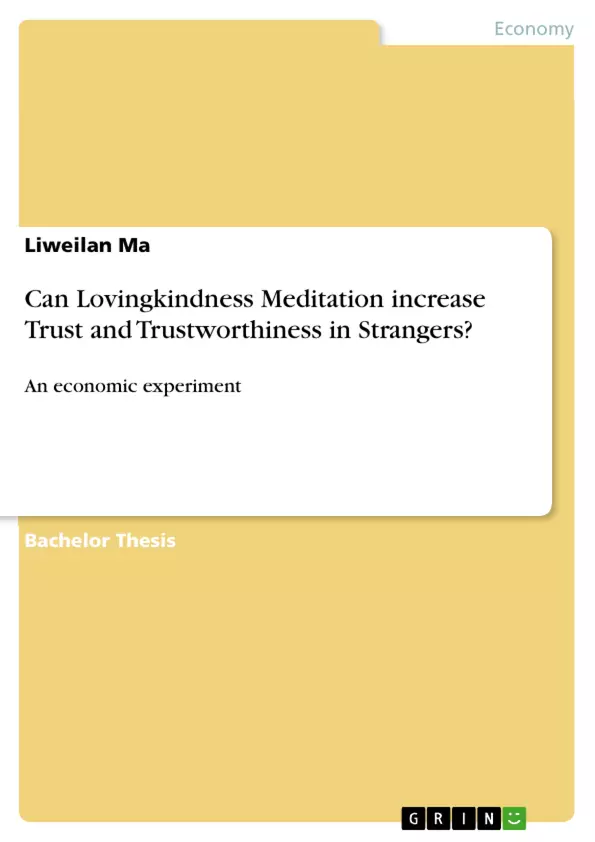Kindness and trust are essential part of our society, since they are required everywhere where humans interact with each other. However, nowadays rising societal isolation and distrust within the society can be observed, therefore, we ask the question whether and how these qualities can be fostered. In this study, we designed an economical experiment in order to examine whether the traditional Buddhist practice called lovingkindness meditation can increase trust, trustworthiness and kindness. In order to assess the effects of time spent on practice, one treatment is a brief loving kindness meditation in a controlled laboratory context, while the second is an intervention lasting eight weeks. In comparison to the neutral control groups, a significant increase of trust, trustworthiness and kindness of the lovingkindness meditation group is expected. In addition, we hypothesized that participants of the field experiment will show larger positive effects in these three measurements than those of the laboratory treatment.
Inhaltsverzeichnis (Table of Contents)
- Acknowledgements
- Abstract
- 1. Introduction
- 2. Lovingkindness Meditation and Trust – a Literature Review.
- 2.1. Meditation and Lovingkindness
- 2.2. Trust and Trustworthiness.
- 3. Experiment – Design, Measures & Hypotheses.......
- 3.1. Research Question....
- 3.2. Participants..\n
- 3.3. Procedure...\n
- 3.4. Measures of Trust, Trustworthiness and Kindness....\n
- Questionnaire
- 3.5. Hypotheses about Trust, Trustworthiness, Kindness and Game Outcome....
- 3.6. Further Steps to Conduct the Experiment.
- 4. Discussion about Limitations and Future Directions
- 5. Conclusion..........\n
- References
- Appendix
- Appendix A: Mach-IV Scale
- Appendix B: Instructions for the T1 Group
- Appendix C: Short Stories
- Appendix D: Mini-Questionnaire for T2/C2....
- Appendix E: Control Questions for Trust Game.
- Appendix F: Questionnaire.
- Appendix G: Instruction Sheet for T2 and C2
- List of figures
- List of tables
Zielsetzung und Themenschwerpunkte (Objectives and Key Themes)
This thesis investigates the potential of lovingkindness meditation to foster trust and trustworthiness in strangers. Through a controlled experiment, the study explores whether engaging in lovingkindness meditation, in both a brief laboratory setting and an eight-week intervention, can increase levels of trust, trustworthiness, and kindness compared to neutral control groups. The study aims to assess the impact of time spent on lovingkindness practice and determine whether the field experiment demonstrates larger positive effects compared to the laboratory treatment. * The potential of lovingkindness meditation to promote trust and trustworthiness. * The impact of time spent practicing lovingkindness meditation on trust and trustworthiness. * The comparison of effects between a brief laboratory setting and a longer-term intervention. * The influence of lovingkindness meditation on prosocial behavior. * The potential applications of lovingkindness meditation for fostering trust and kindness in society.Zusammenfassung der Kapitel (Chapter Summaries)
The introduction sets the stage for the research by highlighting the significance of kindness and trust in human interactions, particularly in light of rising societal isolation and distrust. The second chapter delves into the literature surrounding lovingkindness meditation and its relationship to trust and trustworthiness, providing a theoretical foundation for the study. Chapter 3 outlines the experimental design, measures, and hypotheses. It details the research question, participant characteristics, the experimental procedure, and the measures used to assess trust, trustworthiness, and kindness. The chapter also outlines the hypotheses regarding the impact of lovingkindness meditation on trust, trustworthiness, kindness, and game outcomes. Chapter 4 is dedicated to a discussion of limitations and future directions for research. It explores potential shortcomings of the study and proposes avenues for further exploration and development.Schlüsselwörter (Keywords)
The core keywords and focus topics of this thesis revolve around the investigation of lovingkindness meditation and its effects on trust, trustworthiness, and kindness in strangers. The study utilizes a trust game to assess prosocial behavior and explores the potential of meditation to influence individual behavior and social interactions. Key concepts include lovingkindness meditation, trust, trustworthiness, kindness, prosocial behavior, trust games, and the potential of meditation practices for promoting positive social change.Frequently Asked Questions
What is Lovingkindness Meditation?
It is a traditional Buddhist practice (also known as Metta) designed to foster feelings of unconditional kindness, compassion, and warmth towards oneself and others.
Can meditation increase trust in strangers?
The study hypothesizes that participants practicing lovingkindness meditation will show a significant increase in trust, trustworthiness, and kindness compared to control groups.
What is the difference between the laboratory and field experiment in this study?
The laboratory treatment is a brief, one-time intervention, while the field experiment (intervention) lasts for eight weeks to assess long-term effects.
How is trust measured in this research?
The study uses an economical experiment called a "Trust Game" along with questionnaires and scales like the Mach-IV to assess behavioral and psychological changes.
Why is this research relevant to modern society?
It addresses modern issues of societal isolation and distrust by exploring scientific methods to foster prosocial qualities and positive social change.
- Quote paper
- Liweilan Ma (Author), 2016, Can Lovingkindness Meditation increase Trust and Trustworthiness in Strangers?, Munich, GRIN Verlag, https://www.grin.com/document/426992



